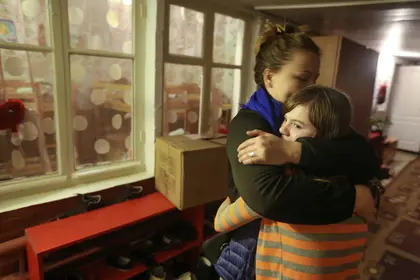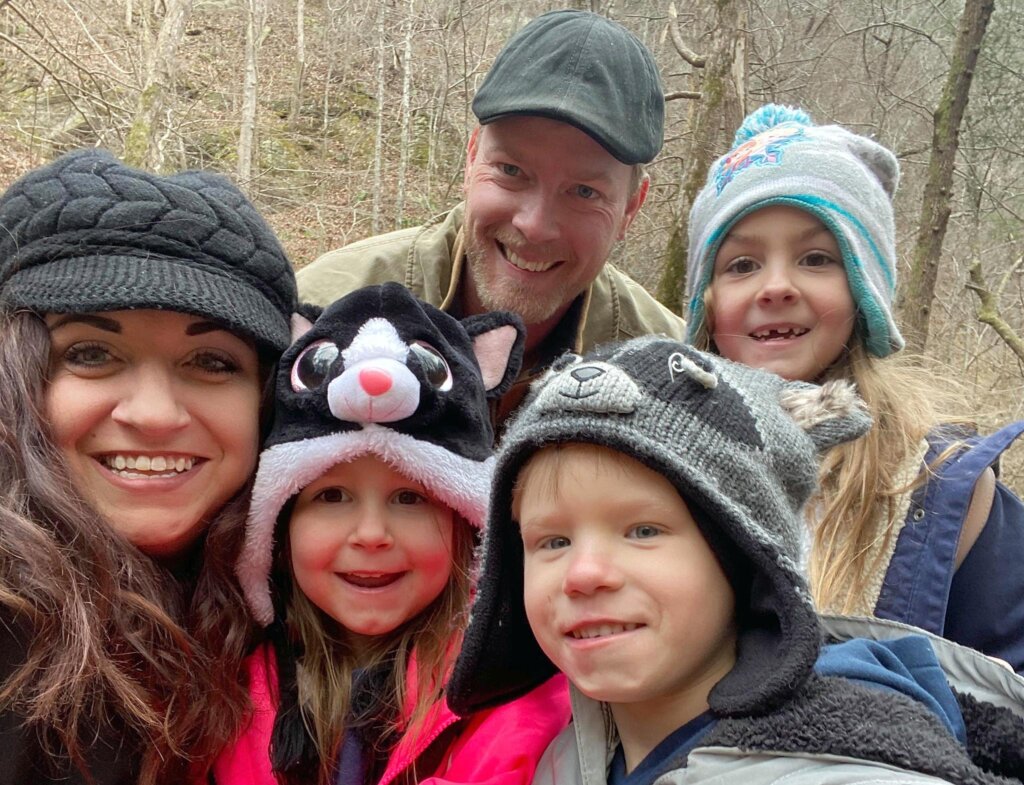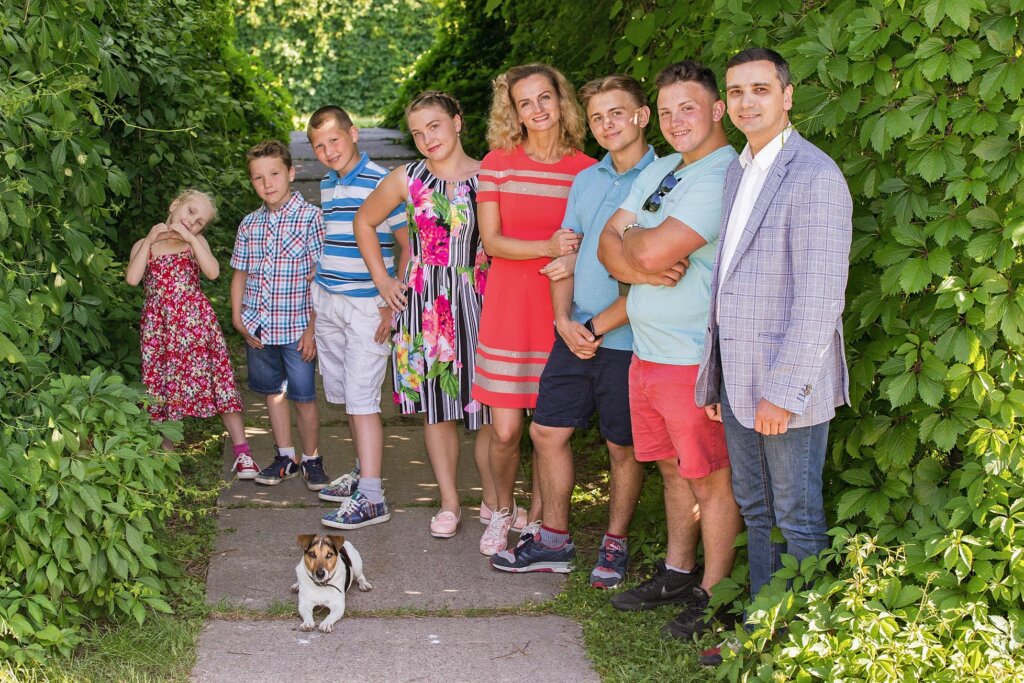In late October, over three years ago, U.S. resident Jessica Aubert stood with her husband and two baby daughters at the Kyiv railway station waiting for the overnight train to Izmail, a small city in southern Odesa Oblast.
Excited and a little nervous, they were rushing to see their future son for the first time.
JOIN US ON TELEGRAM
Follow our coverage of the war on the @Kyivpost_official.
“We went to an orphanage there and saw him — a very small and very quiet boy,” Aubert told the Kyiv Post.
It was the endpoint of the family’s journey from Tennessee to Ukraine. They ended up adopting the Ukrainian baby boy originally named Ivan, now Jessayah.
“As soon as we saw him for the first time, my husband said ‘this is the one,” Aubert recalls. “We did love him immediately.”
But the adoption was not easy. It took the Aubert family almost a year, two costly trips to Ukraine, and tons of paperwork to find Jessayah and take him home.
The overly bureaucratic procedure often stops people from adopting Ukrainian kids: As of January 2021, there were over 91,000 kids in orphanages all over Ukraine, which is among the highest numbers in Europe, experts say.
Destroyed personalities
When Aubert first saw Jessayah at the orphanage back in 2017, the almost-three-year-old boy was the same size as her one-year-old daughter. He was uncommonly quiet and didn’t want to play.
“It was almost like he didn’t know how to play at all,” Aubert says.
According to Maria Artemenko, the founder of Dobrodiy Club charity (“dobrodiy” means “benefactor” in Ukrainian) that provides children in orphanages with career counseling, such kids often face egregious abuse that leads to low self-esteem and developmental issues.
“Orphanages destroy personalities,” Artemenko told the Kyiv Post.
Leonid Lebediev, a former aide to the social policy ministry, says that most children who leave orphanages are not prepared for independent life. Stigmatized by society, orphans often struggle to get jobs and socialize after the institutions. Some of them end up homeless.
Lebediev, who has adopted six children together with his wife, says that adoption is a chance for them to not only survive but to start living a happy, fulfilling life.
“Children have to live in families and feel mutual love,” Lebediev told the Kyiv Post.
Jessayah is almost seven now. Aubert says he’s no longer a quiet boy. When they brought him home to the U.S. he immediately became an “excited little kid,” who loves his family and gladly plays with his sisters.
“Once you take the child out of the institution, that’s when you see the real personality,” Aubert says. Artemenko agrees, saying that love is the most important factor missing at orphanages.
Unfortunately, adopting kids from orphanages in Ukraine is harder and less frequent than putting kids in there.
According to the Di Platform website that monitors the reform of orphanages in Ukraine, launched by former children’s ombudsman Mykola Kuleba, only 7,344 out of over 91,000 children in orphanages are actually orphans or are deprived of parental care — the legal status needed for a child to be adopted.
The remaining 84,165 kids are “social orphans,” who have at least one living parent and often come from disadvantaged families that are unwilling or unable to take care of them.
These kids can’t be adopted.
“It’s a disaster,” Lebediev says. “They will probably live in this system until turning 18 and there is nothing we can do.”
To reduce the number of social orphans, Ukraine needs to better support families in need. Orphanages’ staff should also monitor the situation: In case parents don’t visit their kids for over six months, they should promptly apply for legal status for kids to be adopted.
But since the government allocates funds to maintain children in orphanages — on average about $760 per child per month — their staff is often not interested in having fewer children, Lebediev says.
“The system simply doesn’t give them a chance,” he adds.
This is just one of many problems.
Bureaucratic nightmare
Bureaucracy is one of the main obstacles.
Ukrainians and foreigners who want to adopt children must prepare for an uneasy process that starts with collecting multiple documents and certificates on health and housing conditions, income, and absence of criminal records.
The last one, Lebediev says, takes about one month to get. The full list of documents can be found on the social ministry’s website.
Ukrainians are obliged to take courses on adoption, which takes around a month and apply to local children’s services. If they don’t find a child they want to adopt within a year, they have to renew all their documents.
Foreigners have to submit an application to adopt a foreign child and take a “home-study” course. Then, they have to translate documents into Ukrainian and send them to the social ministry.
The whole process can take around a year or longer: Foreigners have to travel to Ukraine two to four times to do the interview with the ministry, find and meet a child, and attend court hearings that can also take months, according to Lebediev.
Each step often requires additional documents like permission to meet children at the orphanages, and more.
“It’s a long process,” Lebediev says.
Finding the right child can also be difficult. The social ministry’s website offers short profiles of children eligible for adoption but they only contain limited information and often outdated photographs. There is an option to see video profiles on Lebediev’s “Change One Life – Ukraine charity fund” that has been helping Ukrainian orphans to find families since 2014.
Although adoption shouldn’t be an easy procedure, according to the experts, it should be less bureaucratic: Lebediev says it shouldn’t take years, but around 6–9 months, for families to prepare.
Iryna Suslova, an adviser to the head of the parliament’s human rights committee, says that it should be easy to collect the documents and certificates online and that courts should consider adoption cases more promptly.
Now, however, the number of adoptions in Ukraine is relatively low. In 2020, 1,239 children were adopted, while in 2019 there were 1,810 adoptions, according to Ukraine’s social policy ministry.
Foreign adoptions declines as well: Only 247 children were adopted by foreigners in 2020, which is 128 children less than in 2019.
“If the law was more loyal, there would have been not 1,000 adoptions a year, but 5,000,” Lebediev says.
Children first
Besides making adoption easier for parents, Ukraine should take care of the children first.
Lebediev says that Ukraine needs to ban “the secret adoption” also called closed adoption — when a pending adoption is kept secret from a child and no identifying information is provided either to birth families or adoptive families — which can lead to numerous psychological traumas for everyone involved.
He believes that closed adoption is a “relic from the USSR” that was “invented by adults to protect the rights of adults and violates the rights of children.” It also doesn’t allow social workers to check on an adopted child and eventually “brings no benefits to children.”
Changing the country’s perception of adoption is crucial. Experts agree that volunteers and nonprofits should not be the only ones who promote adoption and work to destroy its stereotypes. Other authorities should do so as well.
“There is no information or educational campaigns launched by the government that adoption is normal and that these children are normal,” Suslova says.
Artemenko says that to improve the system, Ukraine needs to think about the children first, to make them its focus. According to Suslova, Ukraine needs to ratify The Hague Adoption Convention that manages international adoption and protects children from child laundering and trafficking, to make foreign adoption safer for children and easier for parents.
“They are the future of our country,” Artemenko says.
But despite the imperfections of Ukraine’s adoption system, Aubert says she has never regretted adopting a Ukrainian child and would “definitely do that again.”
“It was absolutely the best decision that we have made as a family,” she says.
You can also highlight the text and press Ctrl + Enter






